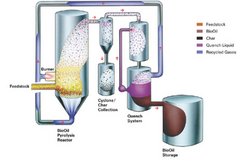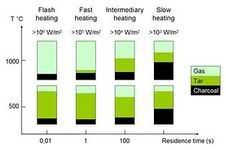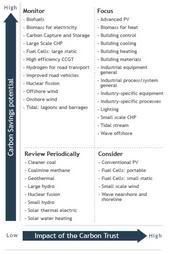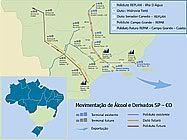Carbon Trust launches £5 million 'Pyrolysis Challenge' to boost use of bio-oil for biofuels
 The Carbon Trust is calling for Expressions of Interest from potential partners within the scientific community to collaborate in the development of a world-class commercially viable pyrolysis oil upgrading process. The Carbon Trust - an independent low carbon economy research company created by the British Government - will potentially invest £5 million (€6.6/US$9.8 million) to one or more commercially-focussed research projects in this area of advanced biofuels over next 3-5 years.
The Carbon Trust is calling for Expressions of Interest from potential partners within the scientific community to collaborate in the development of a world-class commercially viable pyrolysis oil upgrading process. The Carbon Trust - an independent low carbon economy research company created by the British Government - will potentially invest £5 million (€6.6/US$9.8 million) to one or more commercially-focussed research projects in this area of advanced biofuels over next 3-5 years.As part of its mission to accelerate the move to a low carbon economy, the Carbon Trust has identified pyrolysis oil from sustainable sources of biomass as having the potential to produce low-cost fuels with low system greenhouse gas (GHG) emissions - if it can be integrated into a conventional refinery.
 Pyrolysis is a process in which organic materials - any type of biomass - are heated in absence of air in a reactor (schematic, click to enlarge). Under these conditions, organic vapours, pyrolysis gases and charcoal are produced. Depending on the residence time and the temperature to which the biomass is exposed, varying amounts of these products are obtained (figure, click to enlarge). Under fast pyrolysis (temperatures of 450 - 600 °C), the vapours are condensed to bio-oil and typically, 70-75 wt.% of the feedstock is converted into this oil (also known as 'biocrude' or 'pyrolysis oil').
Pyrolysis is a process in which organic materials - any type of biomass - are heated in absence of air in a reactor (schematic, click to enlarge). Under these conditions, organic vapours, pyrolysis gases and charcoal are produced. Depending on the residence time and the temperature to which the biomass is exposed, varying amounts of these products are obtained (figure, click to enlarge). Under fast pyrolysis (temperatures of 450 - 600 °C), the vapours are condensed to bio-oil and typically, 70-75 wt.% of the feedstock is converted into this oil (also known as 'biocrude' or 'pyrolysis oil').However, the properties of the bio-oil produced from current fast pyrolysis processes are far from suitable for direct integration. The Pyrolysis Challenge aims to produce oil with the properties required for integration either by modifying the pyrolysis process to produce better quality oil directly; or upgrading the oil before or at the refinery.
The Carbon Trust is therefore seeking a potentially wide range of partners to work with, who will commit an element of matching support to deliver a breakthrough in this area. Partners may include refinery technology developers, catalyst developers and research organisations involved in the study of pyrolysis processes, bioenergy and relevant related disciplines.
 Through applied research and development, the expected outcomes of the Pyrolysis Challenge include:
Through applied research and development, the expected outcomes of the Pyrolysis Challenge include:- Proof of scientific and engineering principle for a novel process for low-cost and low GHG intensity upgrading of biomass pyrolysis oil
- Complete characterisation of the upgraded oil, including details of characterisation processes and the impact of different feedstocks
- An assessment of the likely commercial and environmental value of any associated co-products and processes for their exploitation
- Development of a large lab-scale or small industrial demonstration unit
- Modelling of the full scale process economics, whole system GHG intensity and key technical parameters
The Carbon Trust sees bioenergy as the key renewable for delivering emissions reductions (table, click to enlarge):
 energy :: sustainability :: biomass :: bioenergy :: biofuels :: fast pyrolysis :: bio-oil :: biocrude :: biorefining :: emissions :: Carbon Trust ::
energy :: sustainability :: biomass :: bioenergy :: biofuels :: fast pyrolysis :: bio-oil :: biocrude :: biorefining :: emissions :: Carbon Trust :: The recent EU announcement that Britain has to generate 15% of its energy from renewable sources by 2020 changes the entire energy equation for the UK. Energy from sustainable sources of biomass could have a major role in reducing green house gas emissions from transport. However, many ‘first generation’ biofuel supply chains offer only limited reduction in carbon emissions and their adoption has been driven by other factors. The Carbon Trust therefore seeks to increase the rate at which more advanced ‘second generation’ technologies, that do have the potential to deliver sustainable low-carbon biofuels, come to market. - Mark Williamson, Director of Innovations at the Carbon TrustThe Carbon Trust business incubators provide strategic and business development consultancy for early-stage businesses with genuine commercial and technical promise leading to low carbon technologies.
Workshop
The Carbon Trust is organising a Pyrolysis Challenge workshop, to take place in Central London on the 11th March 2008 to further explain the pyrolysis challenge and opportunity and give researchers a chance to network.
The workshop will be an interactive, practical session, facilitated by an experienced industry figure, designed to generate opportunities for networking and collaboration. The day will begin with an introduction to the Carbon Trust, our support for low-carbon technologies and our rationale for investment in pyrolysis oil upgrading at this time. The Carbon Trust will then outline the process for bidding to carry out the work and take questions from the audience. In addition, an eminent speaker will give their perspective of the challenge and opportunity. The organisation will then conduct facilitated brainstorming discussions around how to develop interdisciplinary consortia, how to encourage and develop latent capability and the best models for commercial exploitation of the results.
The Carbon Trust is an independent company set up by government in response to the threat of climate change, to accelerate the move to a low carbon economy by helping organisations reduce their carbon emissions and by developing commercial low carbon technologies. The Carbon Trust works with UK business and the public sector through its work in five complementary areas: insights, solutions, innovations, enterprises and investments. Together these help to explain, deliver, develop, create and finance low carbon enterprise.
The Carbon Trust is funded by the Department for Environment, Food and Rural Affairs (Defra), the Department for Business, Enterprise and Regulatory Reform (BERR), the Scottish Government, the Welsh Assembly Government and Invest Northern Ireland.
References:
Carbon Trust: Carbon Trust issues 2nd generation biofuel challenge - February 18, 2008.
Carbon Trust: Technology Accelerator.
Carbon Trust: Incubator Program.
Carbon Trust: Applied Research.
Carbon Trust: Carbon Trust Support for Low Carbon Innovation [*.pdf].
Carbon Trust: An introduction to the Carbon Trust Applied Research Grant Programme [*.pdf].
Carbon Trust: An introduction to the Carbon Trust Incubator Programme [*.pdf].
Article continues
 --------------
--------------
 'Obesity Facts' – a new multidisciplinary journal for research and therapy published by Karger – was launched today as the official journal of the European Association for the Study of Obesity. The journal publishes articles covering all aspects of obesity, in particular epidemiology, etiology and pathogenesis, treatment, and the prevention of adiposity. As obesity is related to many disease processes, the journal is also dedicated to all topics pertaining to comorbidity and covers psychological and sociocultural aspects as well as influences of nutrition and exercise on body weight. Obesity is one of the world's most pressing health issues, expected to affect 700 million people by 2015.
'Obesity Facts' – a new multidisciplinary journal for research and therapy published by Karger – was launched today as the official journal of the European Association for the Study of Obesity. The journal publishes articles covering all aspects of obesity, in particular epidemiology, etiology and pathogenesis, treatment, and the prevention of adiposity. As obesity is related to many disease processes, the journal is also dedicated to all topics pertaining to comorbidity and covers psychological and sociocultural aspects as well as influences of nutrition and exercise on body weight. Obesity is one of the world's most pressing health issues, expected to affect 700 million people by 2015.










Thursday, February 21, 2008
Major scientific push to tackle agricultural productivity and food security in developing world
In this context, it is noteworthy that an important new scientific push to tackle agricultural productivity in the South is being launched today by the UK's Biotechnology and Biological Sciences Research Council (BBSRC) and the Department for International Development (DFID). £7 million (€9.2/US$13.7 million) is being invested in new research to tackle some of the most damaging and widespread pests, diseases and harsh environmental conditions which can devastate crop yields across the developing world.
Three out of four poor people in developing countries live in rural areas on less than a dollar a day. Most depend on agriculture for their livelihoods. Increasing agricultural productivity will thus benefit millions through higher incomes, more and cheaper food, and more jobs in both rural and urban areas.
The BBSRC and the DFID are unveiling 12 new projects as part of their flagship initiative - Sustainable Agriculture Research for International Development (SARID) - to harness the UK's bioscience research base to address the challenges of agriculture and food security in developing countries.
The new projects will look at how a variety of crops - from maize to coconuts, rice to bananas - respond at a molecular level to hostile factors including attack by pests and diseases as well as inclement conditions. Their findings will offer new and exciting opportunities to develop crops better able to survive and thrive in their changing environments. Such advances in crop science could revolutionise the way farmers are able to farm across the developing world and have a significant impact on reducing poverty.
The following 12 projects [*.pdf] receive funding for the next four years:
Saving staple foods from witchweed attack - Rothamsted Research, UK, and International Centre of Insect Physiology and Ecology, Kenya: Maize is the staple food for half of the population of sub-Saharan Africa, but unfortunately it is also susceptible to damage from pests and parasitic weeds, which can result in total yield loss. Parasitic witchweed is a major culprit.
Researchers from the UK and Kenya are looking at new ways of tackling witchweed. Research has shown that when desmodium, a nitrogen-rich legume, is grown amongst maize, it can increase yields from less than one tonne per hectare to over five tonnes by preventing witchweed from growing.
Halting armyworm rampage with biological pesticide - University of Lancaster; Natural Resources Institute, Greenwich UK; Laurentian University, Canada; and Sokoine University of Agriculture, Tanzania: Like locusts, the African armyworm is a major migratory insect pest in Africa. Eggs laid by African armyworm moths hatch into extremely dense swarms of caterpillars which feed voraciously on cereal crops. Up to 70% of farmers across Africa suffer from crop damage and loss caused by armyworms.
Outbreaks occur in most years and spread across much of Africa. Currently the only way to control these outbreaks is by spraying with chemical insecticides, but these are too expensive for most farmers and can damage the environment.
Using a radical new solution, researchers will investigate the use of a naturally occurring virus in armyworms - armyworm nucleopolyhedrovirus (NPV). NPV is a highly specific virus, harmless to humans and other wildlife, but in most years the virus appears too late to prevent armyworms from causing serious crop damage:
Rice security for billions of people - National Institute of Agricultural Botany, UK; and International Rice Research Institute, Philippines: Rice is the staple food for over two billion people, but lack of water and disease limit its production across the developing world. There is an urgent need for new breeds of rice that can cope with changing climate conditions and to improve yield to feed growing populations. It is an issue central to future global food security.
Researchers will look at the genetic make up of rice as well as its genetic expression to identify genes which may be crucial in developing new types of rice resilient to climate change and diseases.
Improving food security for 500 million people with Pearl Millet - Institute of Grassland and Environmental Research, UK; International Crops Research Institute for the Semi Arid Tropics, All India Coordinated RP on Pearl Millet, India; and University of Cape Coast, Ghana: Pearl millet can produce grain and fodder under hot, dry conditions in infertile soils where other crops fail completely. It provides food security to over 500 million people predominantly in Africa and Asia. Although compared to other cereals, pearl millet is better adapted to cope without much water, low and unpredictable rainfall severely reduces its yield stability.
Improving pearl millet’s genetic tolerance to drought offers a sustainable route to alleviating this problem. Scientists will look at genes and gene behaviour in different conditions to develop tools to simplify and increase the precision of breeding for increased drought tolerance in pearl millet.
Breeding tolerant coconuts - University of Nottingham UK; and Oil Palm Research Institute, Ghana: Lethal-yellowing diseases caused by phytoplasma bacteria have devastated plantations in tropical regions of Africa, causing severe economic hardship and environmental damage.
Coconut breeders have identified some palm varieties which show resistance or tolerance to the diseases. Researchers will study these coconuts and exploit their resistance to produce improved varieties for future plantations. They will examine how phytoplasmas are transmitted between coconuts and to look more closely at the molecular and genetic basis of disease resistance and tolerance in coconuts.
This information will then be used in breeding programmes and replanting programmes to minimise the risk of future coconut harvests being destroyed by disease.
Kale and Cabbages to beat Black Rot - University of Warwick, Central Science Laboratory, UK; and CABI and KARI, Kenya: Kale and cabbage are two of the most important vegetables for the local economy in Kenya and other East African countries, but often, entire harvests are wiped out by Black Rot - a seed-borne disease which penetrates the leaves and causes spreading yellow lesions. Affected leaves drop prematurely and the plants can die.
Researchers are joining forces to provide a sustainable solution to the black-rot problem. They are looking to discover the genes necessary to breed kale, cabbages and other brassicas with resistance to Black Rot. Currently little is known about this type of resistance.
Putting more sweet potato on the table in Africa - Natural Resources Institute, University of Cambridge, and Central Science Laboratory, UK; The International Potato Centre, Peru; Makerere University, and National Agricultural Research Organisation, Uganda: Producing crops by cuttings or other means of vegetative propagation is common for many tropical staple foods including sweet potato. In sub-Saharan Africa, about half of all plant derived calories are grown in this way.
The use of cuttings gives such crops a head start over ones grown from small seeds but the downside is that viruses are often transferred within the cuttings. In developed countries, certified virus-free schemes protect commercial planting materials but these schemes are not financially or logistically viable for staple crops and farming systems in developing countries.
Some local varieties of sweet potato have been found to be highly resistant to a broad range of viruses. Researchers will study this resistance further, seek markers for the responsible genes and use this knowledge to speed up breeding virus resistant crops, particularly orange-fleshed sweet potatoes, as they contain pro-vitamin A to combat blindness in African children.
Fighting nematode worms with fungus - Rothamsted Research, UK; and University of Nairobi, Kenya: Root-knot nematodes are microscopic worms that feed on plant roots, stunting their growth and causing yield losses of US$70 billion each year. Researchers are harnessing a natural soil fungus to destroy the worms’ eggs reducing damage to crops.
Nematodes destroy a wide range of crops worldwide, particularly those growing in tropical soils. In sub-Saharan Africa the devastation caused by nematode worms is set to worsen as a result of climate change. Scientists from Rothamsted Research have been working with the naturally occurring soil fungus Pochonia chlamydosporia, which kills the eggs of nematodes. This fungus has been registered as a bio control agent. But in order to maximise the nematodedestroying potential of this fungus the researchers are now looking at how to create optimal soil conditions for it.
Reducing arsenic levels in rice - University of Aberdeen, UK; and University of Calcutta, India: Arsenic contamination of rice paddies is a major problem across South East Asia. It is caused by irrigation with arsenic contaminated groundwater, pollution resulting from base and precious metal mining and the use of municipal solid waste as fertilizer.
Arsenic is a chronic carcinogen. In Bangladesh alone there has been a three-fold increase of inorganic arsenic in rice. As a result, across the South East Asian region people are being exposed to dangerous levels of inorganic arsenic in their diet.
Preliminary experiments have identified genetic variation rice that affects the amount of arsenic that can accumulate. Researchers will look at types of rice which have lower takeup levels of inorganic arsenic to unravel the genetic basis for this. Field experiments will be carried out in India, Bangladesh and China on arsenic contaminated soils with the ultimate aim of breeding genes for local rice which will have lower uptake levels of inorganic arsenic for use in areas with high arsenic in the soil.
More bananas for Africa - University of Leeds, UK; and International Institute of Tropical Agriculture, Uganda: Nearly one third of the sub-Saharan African population is severely undernourished. Plantain and other types of cooking banana provide 27% of the daily calorie intake of Ugandans and many people in several African countries. But up to 70% of plantains are often damaged or destroyed by nematode worms, which feed on the roots of plantains.
To stop the devastating impact of nematode worms, breeding plantains resistant to the worms is vital. Plantains are sterile crops that produce no seeds, this hampers their improvement by conventional plant breeding but not by plant biotechnology. Creating the new biosafe plants will build on previous work carried out in both the UK and Uganda. A major part of the project is ensuring the new resistant plantains can be produced in Africa and made widely available to subsistence growers to improve their yield and ultimately the dietary intake of millions.
Defeating the witchweed famine threat - University of Sheffield, National Institute of Agricultural Botany, UK; International Crops Research Institute for the Semi Arid Tropics, India; and African Rice Centre, Senegal: Many important subsistence crops, relied on by billions of people, are at risk of attack from a noxious parasitic plant - witchweed. Over 40% of the cereal-producing areas of sub-Saharan Africa are infested with the parasite and the livelihoods of some of the world’s poorest farmers are threatened. Researchers will try to find ways to produce crops resistant to witchweed.
Currently, the most commonly used strategies to reduce the impact of witchweed are hand weeding, improving soil fertility and growing some crops which are not attacked by the parasite, but these methods are costly and largely ineffective.
Producing crops resistant to witchweed would improve the stability of food supply for people who rely on crops such as sorghum, maize, millet and rice. Researchers from the University of Sheffield have already identified some rice varieties that are resistant to attack by witchweed. The next step for the international team is to identify what makes these varieties resistant and which genes play a role. Once this is known, they will look for similar genes in other cereals and explore the possibility of breeding cereals with increased resistance to witchweed.
Eradicating a new strain of wheat disease that threatens African crops - John Innes Centre, UK; and University of Free State, South Africa: A new strain of stem rust, a major fungal disease of wheat, has emerged in East Africa. With the ability to spread thousands of miles and the potential to wipe out 40-70% of wheat yields an outbreak has already caused a painful spike in wheat prices in the region. Scientists are now working together to identify genetic resistance to the disease and protect vital crops.
In the past, stem rust was effectively controlled using cultivated wheat resistant to the disease. However, in 1999 a new virulent strain of stem rust emerged in Uganda - Ug99 - infecting many previously resistant wheat cultivars. Ug99 presents a new threat across the developing world, not least because of its ability to spread thousands of miles. Most farmers cannot afford to use expensive fungicides to control the disease so breeding new resistant varieties of wheat is crucial.
Scientists will spend the next four years looking at the genetic make up of over 300 types of African wheat varieties for resistance to both stem rust and a related fungal disease, stripe rust. DNA markers will be used to define the extent of the variation between these different varieties. One wheat of particular interest to the scientists is Cappelle Desprez, an old European variety which has so far proved resistant to stripe rust in both Europe and South Africa.
A genetic mapping study will look specifically at this wheat to identify the genes
contributing to the resistance.
All of the projects unveiled today involve unique partnerships between UK scientists and researchers from institutions in Africa, Asia and elsewhere.
BBSRC and DFID announced the SARID initiative in 2006 to foster high-quality research that will contribute to achieving the Millennium Development Goals for combating the eight major problems faced by the developing world including poverty and starvation.
The research announced today is the first from this initiative. A second grant round, focussing on animal health will be announced later in 2008.
Picture: the African armyworm is a major migratory insect pest in Africa. Eggs laid by African armyworm moths hatch into extremely dense swarms of caterpillars which feed voraciously on cereal crops. Up to 70% of farmers across Africa suffer from crop damage and loss caused by armyworms. New research funded by SARID will help tackle this pest. Credit: BBSRC.
References:
Biotechnology and Biological Sciences Research Council: Major scientific push to tackle agricultural productivity and food security in developing world - 21 February 2008
BBSRC and DFID: Improving agricultural productivity and food security in developing countries [*.pdf] - February 21, 2008.
Biopact: FAO unveils important bioenergy assessment tool to ensure food security, shows global biofuels potential - February 11, 2008
Article continues
posted by Biopact team at 5:10 PM 0 comments links to this post
